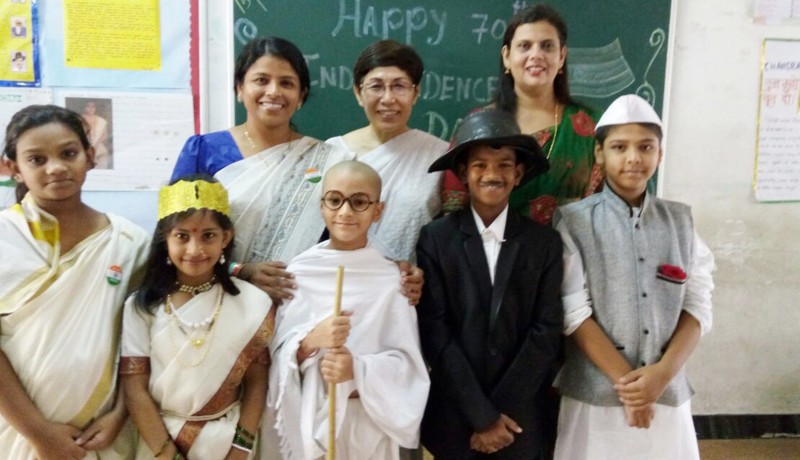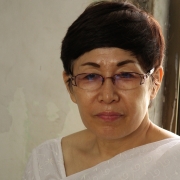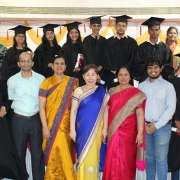
People

Navi Mumbai school opens doors for underprivileged kids; Korean founder Sookja Kong Bangera says she is ready to take the next step
Living a selfless life is pretty unusual in these times but that’s the only life Sookja Kong Bangera knows. Not surprisingly, this South Korean woman, who came to India in 1994, wonders what the fuss is all about when she is applauded for helping educate poor children in Navi Mumbai through a school she set up 21 years ago.
The Mahima Christian School in Koparkhairne is a unique institution as children from privileged and underprivileged backgrounds, including the children of sex workers, sit shoulder to shoulder in class as they acquire the tools to navigate their future. Children who can’t afford an education are enrolled free and comprise 20 per cent of the kids on the rolls. “I want to be there for kids who need it most, as I hope that one day they will pay it forward,” says Sookja.
Born in Incheon, South Korea, 62 year-old Sookja finished her studies in accountancy and volunteered with a missionary organisation, Operation Mobilisation, in her home town. “Through them, I went to England in 1987, where I worked as an accountant and engaged in social work. There, I met people familiar with India and I realised there was great potential to help people here. But it was only many years later that I actually came to India,” says the educator.
When Sookja did arrive in India, she initially stayed with missionary sisters for a short while in Navi Mumbai before she was contacted by a Korean medical team that wanted to visit India to conduct a medical camp. Sookja was able to help them set up their camp via the local municipal corporator in Turbhe Store, a locality in the satellite city.
Turbhe Store is the hub of the sex trade in Navi Mumbai; the more Sookja visited the area, the stronger became her urge to reach out to the children of the sex workers. It was the beginning of a long and satisfying journey. “I saw that their basic nutritional needs were not being met so I started giving them boiled eggs, bananas and milk on my visits.”
Through her social work, Sookja met her husband, Reverend Suraj Bangera. “He was a volunteer and used to assist the poor in Turbhe Store. He visited the area to teach the children the scriptures and devotional songs, and provide them with basic education.” A year later, the couple got married and had a daughter, Sujee, who is now 20. “It became a running joke in my family that we were brought together by boiled eggs and bananas,” Sookja chuckles. “I just wanted to know about India, but then I got stuck and stayed back.”
It was clear to her that education was the only way to help the children get a better life. “I didn’t know where to begin as we first needed a building and a playground. Luckily, we managed to get a small row house on rent in the area. This is how Mahima Christian School started, in 1996.” It’s been 21 years since and the school has relocated more than five times, either at the building owners’ behest or when rent became unaffordable. But Sookja took these challenges in her stride.
Rupa is a single mother who has a son, niece and nephew studying in the school. “My son Jai is in the first standard and he insists on eating dinner only after he has finished his homework. He loves school so much he is reluctant to stay home even when he is ill,” she says. When Sookja helps people, she believes in enabling them to help themselves, in turn creating a sense of community and a support system for them. So she hired Rupa’s brother as a clerk in the school office.
Sai Baba Shetty, who graduated in the school’s first batch, has the school to thank for turning his life around. Shetty was able to speak only Telugu when he enrolled in the school; he now teaches health, safety and manners in English in the same school.
Another remarkable story is that of Johny Francis Anthony, who was five and lived in an orphanage when Sookja first met him. She not only admitted him to her school but adopted him later in 2005 when he had to move to a different orphanage and wasn’t happy there. Now 26, he is a math teacher. “It’s hard to imagine what life would have been like if our lives had not crossed paths,” says Anthony, who is also the school secretary.
Mahima Christian School currently has 180 students on its rolls and operates from two, double-storied buildings. It runs regular classes from nursery to grade 10, and has adopted the Secondary School Certificate curriculum. “Getting here hasn’t been easy and it wasn’t possible to do it alone,” acknowledges Sookja. “It is public service and done with the concept of public serving public.”
Anthony shares that the school uses some unusual teaching practices, making learning both fun and more effective. “We instruct students in a phonetic way and teach them to speak well. The overall attitude of the teachers and school is to help students excel at what they are inherently good.” Over the years, the school has introduced concepts such as ‘servant leaders’ and ‘sharing day’ for students. “Servant leadership allows every student to get a chance to become a leader and serve the class in rotation,” explains Sarita Vaz, a teacher with the school since 2002. “Their duties include ensuring that the classroom is clean and the tables spotless after lunch. The best servant leader wins a prize at the end of the school year. ‘Sharing days’ are Wednesdays and Fridays, when students and teachers get to share each others’ lunch.”
Vaz, , who is the principal of the pre-primary section, teaches English and music at the school. “I live nearby and was looking for a good school for my son back then,” she says. “I learnt about this school from friends whose children had studied here. They said some really nice things about the school. Later, I joined as a teacher.”
Most teachers receive only a small sum as remuneration but that doesn’t make them any less qualified or committed. While Vaz has an MPhil degree, Annamma Mathew, now the principal, was armed with a BEd degree when she was hired by the institution. Mathew met Sookja when they were both helping the poor in Navi Mumbai’s CBD Belapur locality. She was already a nursery teacher but when she learnt about Sookja’s plans to start a school, she came on board.
Sookja and her school have clearly got it right, for a large number of the poor children who have passed through its portals have found a place in the mainstream workforce. “Many have found jobs in call centres while others work in corporate firms and showrooms,” says Anthony. “Some are professionals such as graphic designers and even engineers. Those who are artistically inclined go into art. Basically, they’ve gone into every field,” adds Vaz.
Offering more than a hundred youngsters a better life, year after year, is not enough for Sookja. “We are thinking of branching out,” she reveals. “After much perseverance, we have been allotted land by the government in Roha, Raigad district. Though it is a little far, we plan to set up a boarding school there, so city children can also come there and have a good education in a good environment.”
― Anisha Samuel
August 2018
you may also like to read
-
For the love of Sanskrit
During her 60s, if you had told Sushila A that she would be securing a doctorate in Sanskrit in the….
-
Style sensation
Meet Instagram star Moon Lin Cocking a snook at ageism, this nonagenarian Taiwanese woman is slaying street fashion like….
-
Beauty and her beast
Meet Instagram star Linda Rodin Most beauty and style influencers on Instagram hope to launch their beauty line someday…..
-
Cooking up a storm!
Meet Instagram star Shanthi Ramachandran In today’s web-fuelled world, you can now get recipes for your favourite dishes at….









